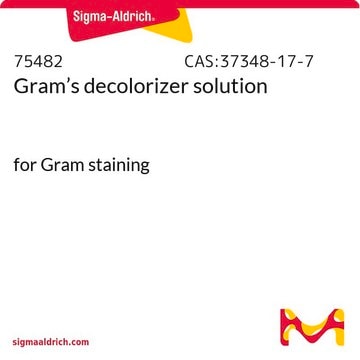77627
Poly(vinylpolypyrrolidone)
~110 μm particle size
Synonym(s):
PVPP, Polyvinylpyrrolidone, cross-linked
Sign Into View Organizational & Contract Pricing
All Photos(1)
About This Item
Recommended Products
form
lumps
Quality Level
particle size
~110 μm
application(s)
food and beverages
SMILES string
C=CN1CCCC1=O
InChI
1S/C6H9NO/c1-2-7-5-3-4-6(7)8/h2H,1,3-5H2
InChI key
WHNWPMSKXPGLAX-UHFFFAOYSA-N
Looking for similar products? Visit Product Comparison Guide
Related Categories
General description
Poly(vinylpolypyrrolidone) is a crosslinked homopolymer form of purified vinylpyrrolidone. It is hygroscopic in nature. It has been used widely in plant hormone purification. It binds with phenolic compounds by hydrogen bonding.
Application
It was used as lysis buffer in measuring DNA concentration. It was also used in detection of recombinant proteins from leaf extracts using Surface enhanced laser desorption ionization time-of-flight mass spectrometry (SELDI-TOF MS).
Features and Benefits
Complexes with phenolics and alkaloids for their removal from plant samples, thus preventing their modification of proteins and any interference they may cause in spectrophotometric determinations of protein content. This is also reported to improve stability of enzymes.
Storage Class Code
11 - Combustible Solids
WGK
WGK 1
Flash Point(F)
Not applicable
Flash Point(C)
Not applicable
Personal Protective Equipment
dust mask type N95 (US), Eyeshields, Gloves
Choose from one of the most recent versions:
Already Own This Product?
Find documentation for the products that you have recently purchased in the Document Library.
Customers Also Viewed
Heat-stress and light-stress induce different cellular pathologies in the symbiotic dinoflagellate during coral bleaching.
Downs CA
PLoS ONE, 8(12), e77173-e77173 (2013)
A SELDI-TOF MS procedure for the detection, quantitation, and preliminary characterization of low-molecular-weight recombinant proteins expressed in transgenic plants.
Badri MA
Proteomics, 9(2), 233-241 (2009)
P.J.J. Hooykaas, M.A. Hall, K.R. Libbenga
Biochemistry and Molecular Biology of Plants, 27-27 (1999)
Benefits of statins in elderly subjects without established cardiovascular disease: a meta-analysis.
Gianluigi Savarese et al.
Journal of the American College of Cardiology, 62(22), 2090-2099 (2013-08-21)
The purpose of this paper was to assess whether statins reduce all-cause mortality and cardiovascular (CV) events in elderly people without established CV disease. Because of population aging, prevention of CV disease in the elderly is relevant. In elderly patients
Wim-Jan P van Boven et al.
European journal of anaesthesiology, 30(11), 685-694 (2013-09-17)
Restrictive fluid management may protect organ function and improve postoperative outcome in elderly coronary artery bypass grafting (CABG) patients. We assessed organ-specific biomarker release to study the contribution of a fluid restrictive closed circuit concept to organ protection in elderly
Our team of scientists has experience in all areas of research including Life Science, Material Science, Chemical Synthesis, Chromatography, Analytical and many others.
Contact Technical Service



